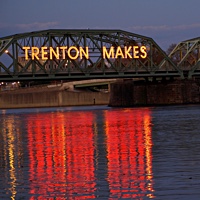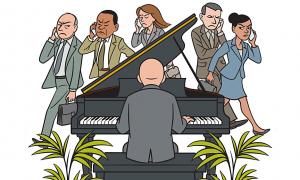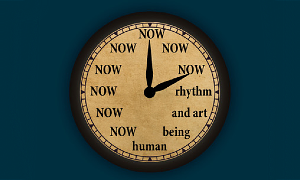Twenty-five years after the Princeton Record Exchange moved to South Tulane Street, treasure hunters still descend, hoping to unearth rare and legendarily valuable albums for a bargain.
By Scott Morgan
It is Wednesday, in the middle of a day in the middle of an unremarkable week, and there are at least 40 people flipping through records or reading the spines of CDs along the walls of the Princeton Record Exchange. The store will draw nearly 800 people before closing this night and this is just on an otherwise unremarkable, non-shopping-season weekday. On a normal Saturday there might be 1,500 customers wending their way through 4,300 square feet of entertainment at 20 South Tulane Street, just off Nassau Street in downtown Princeton.

This, at least, is the estimate of Jon Lambert, the stores general manager and one of 12 employees to have joined the staff before 1993. For the record, there are 15 full-timers, 22 employees overall, meaning that more than half have been around for at least 17 years.
The store itself has been around for 30 years, founded by Barry Weisfeld in March of 1980 at 20 Nassau Street. Thirty years and one move later, Weisfeld still knows every inch of his store, which will celebrate its birthday with a series of concerts and special giveaways beginning this weekend (see box on page 35).
And given his ability to walk up to seemingly random stacks of records and extract the one he is looking for, its easy to get the impression that he knows every one of the 125,000 records, CDs, and DVDs in it.
Weisfeld is a compulsive collector, which he readily admits. Music is an obvious obsession, but hes also quite taken with baseball and promotional hats from large companies. A FedEx hat from the company itself, in fact, is one of his most sought-after caps.
Weisfelds combination of obsession, knowledge, and eidetic memory offers a lesson in the main ingredients in entrepreneurship. Without this particular combination of compulsion and know-how for his subject and for his customers wants it is doubtful a place like the Princeton Record Exchange would have survived for so long.
Records, after all, are an anachronism. Record stores were a great idea in the 1970s, when high-tech meant quadraphonic speaker systems and diamond-chip needles on vinyl albums. They were even a great idea in the 80s, when CDs crushed the vinyl market into a fine powder because there was still a product you could hold in your hands.
Now that the CD market has been beaten stupid by MP3s and digital file sharing, the idea of a physical space packed to its gills with musical hard copies, regardless of the format, sounds just so last-century. And yet, here at the counter, a steady dribble of customers bearing armloads of CDs, records, and movies keeps making its way toward the cash register as new customers skooch past them on their way in the front door.
Part of the Record Exchanges allure is a simple fact from Economics 101 a business share of the market is partially determined by the amount of competition. Apart from the Record Collector in Bordentown, which specializes in live music as much as the pre-recorded kind, the Record Exchange has very little competition. For years it shared Downtown Princeton with Sam Goody, a mainstream chain that, like most of its kind, went belly up when the Internet and iPod made it possible to download 2,000 songs into something the size of a small Post-It pad.
Purists, the kind of people who still enjoy the tactile pleasure of holding a vinyl disc gently by its edges and lowering the arm of a stylus into its groove, proved to be a rather small segment of the public, but Lambert admits that there is little about music that is quantifiable. Something about music makes people a little crazy. People define themselves by the songs of others, he says or by the style of music that was popular when they were in their high school and college years. They get defensive about their preferences, and any perceived attacks upon them is tantamount to a personal insult.
This is not merely some airy observation, this is essential to the health of an enterprise like the Princeton Record Exchange. A place like this thrives on loyalty, and few are more loyal than hardcore fans of music. Thirty years ago Weisfeld stumbled upon the ideal mix of obsessions, music and collectibles, that keep that line at the counter from ever getting too slow.
It was 1979. Weisfeld, a kid from Long Island with a marketing degree from the University of Hartford (Class of 1975), was wondering what to do with himself. He had no direction and no plans. Id have been perfectly happy parking cars for 60 hours a week, he says.
In a way, he was. Weisfeld had a van full of merchandise that he drove to flea markets for a very short while, before he realized that he didnt particularly like sleeping in his office on wheels.
He did like selling records, though, almost as much as he liked having them himself. But the flea market circuit wasnt the ideal marketplace for selling them, so Weisfeld took his van and his collection around to colleges and sold them in student centers and other campus depots.
Back then, the college market for contemporary releases at flea market prices was bountiful. New York was a good market, Weisfeld says. Princeton was a better one. The traffic-heavy mini-metropolis we know today was still a few years off, as was a fully operational Quakerbridge Mall. One of the areas main draws to outsiders was the Princeton University Store, a department store that sold everything from college sweaters to Tastykakes on its four floors.
Weisfeld did a lot of business through the U-Store, giving it a cut of his proceeds, as he did with all the other colleges up and down the Northeast coast. He did well in other college towns too, and supplemented his sales as a DJ. But the lifestyle got old fast. He didnt particularly want to follow his father into the textile business, nor his mother into life as a clerk in Nassau County, but he knew he needed to do something. And somewhere.
The what grew increasingly obvious, but the where hung Weisfeld up for a while. It was between here and Long Island as to where to set up a record shop. He settled on Princeton for several reasons. One, sales here were, on average, his best. Two, Princeton was a place where a lot of people walked around. This was an important factor in 1979, when the country was mired in its second oil embargo of the decade and gas had to be rationed (at the infuriating inflated price of 85 cents a gallon).
I had to do something, he says. So I made a decision to commit to being obsessive about this.
Weisfeld rented a store on Nassau Street that almost immediately became a destination on par with the U-Store. Sales were good and records were plentiful. Then, one day in 1983, an acquaintance came in frothing at the mouth about the blockbuster potential of these things called CDs. Weisfeld heard him out but had no idea what the guy was talking about. Records had already been attacked by 8-track and cassette tapes, and CDs didnt look formidable, so Weisfeld didnt worry.
Then again, Weisfeld didnt really need to worry. Whatever the format of choice, collections of music would still come on plastic discs that needed to be displayed in an actual store. So when CDs decimated the vinyl market, the Princeton Record Exchange simply added CDs to its inventory. It used to do the same with cassette tapes, but Weisfeld says they take up too much room and bring in little cash.
A side effect of the collapse of vinyl, however, was that records suddenly became collectibles. Music companies would no longer be printing up new vinyl and if they would, these pressings would be in limited release. In an unintended way, the near-death of vinyl added a layer to the mix music, able to stir irrational passions in people, now had a format that appealed to treasure hunters.
Twenty-five years after the Princeton Record Exchange moved to South Tulane Street, treasure hunters still descend, hoping to unearth rare and legendarily valuable albums for a bargain. Weisfeld says he still gets five calls a day from people wondering if the store has a copy of a rare album from the 60s that introduces some no-name band called the Beatles. And there is enough of a thrift store vibe to entice those who hope to find the gold nugget that might have slipped through the fingers of the Record Exchanges crew. Not bloody likely. There are few, if any, released artists or collections that these guys havent heard of. And if there is a valuable rarity in the offing, the staff itself is already looking for it. In fact, the most expensive record Weisfeld ever sold was a sealed combo album of the Beatles and the Four Seasons, worth $1,700. The customer? The stores chief vinyl appraiser, Bill Pacquin, who has been with the Record Exchange sine 1984.
In 1999 U.S. 1 featured Pacquin in a story about the used record trade, and he stated There are many records out there that are worth money and there are many records that arent. Its just unfortunate that most of the records that come in arent. That statement still holds up a decade later.
But then, the Record Exchange is not looking to deal in artifacts. Were not a museum, Lambert says. Were priced to move. This buy-low, sell-low angle has worked well for Weisfeld, who explains that computer inventory is kept of every item that goes up for sale. If it hasnt moved in a couple months, the price goes down. The store will make up in volume what it lacks in blockbuster rarities.
How low are the stores prices? People make a living off us, Lambert says. The few used record and CD dealers (including people who sell online or still make the flea market circuit) often come in to buy items that they in turn sell for a profit. It doesnt bother Weisfeld, and if it did, it wouldnt change anything. We cant afford to sit on anything, Lambert says. We have to move product.
Weisfeld built his business on the kind of knowledge it takes to evaluate and properly price merchandise. Lambert, who has been with the Record Exchange for 21 years and can casually rattle off reams of obscure bands as if everyone knows them, says that consistency in evaluating collections the grading system that determines whether a records condition is very good, mint, or whatever is one of the few strict rules the employees here have to follow.
If a record is labeled mint, it has to be perfect in every way, right down to the corners of the cover and sleeve. Few records are or ever were perfect, so the standard is near-mint. All other grades, from very good-plus down to poor, are considered to be worth general percentages of what the same record in near-mint condition would be worth.
While it might be hard to find a mint-condition album at the Princeton Record Exchange, you will certainly never find one in poor condition. If the item is not in listenable condition, it doesnt get past the gatekeepers.
A customer who buys a very-good-plus (VG+) album from the Record Exchange, for example, expects it to be in listenable condition, with maybe a few minor signs of wear and use on the record itself and its packaging, Lambert says. That little label is a mark of faith. The next time that customer buys a VG+ record, he should find it in the same condition.
Past that, Lambert says, the Princeton Record Exchange is as far from corporate and he used to work for the corporate chain record stores you used to see in the mall as you can get. Theres not a lot of micromanaging, he says. Were professionals with freedom. You get to use what you love about music. Lambert, who grew up in Princeton and graduated from the school of hard knocks, ran Listening Booth, a chain record store that was one of the most popular destinations in Quakerbridge Mall in the 1980s, at the ripe old age of 19. One day, tired of corporate oversight (and the chains shortsightedness about its customers preferences), he answered an ad for the Record Exchange and he hasnt thought about leaving yet.
In his tenure here, Lambert says the store has built its reputation and business not just on the consistency of its grading system but on a unique ability to remain fluid. He compares the difference between chain stores and the Record Exchange as that between ocean liners and tug boats. Ocean liners have a hard time changing direction, and that cost chain record stores (Tower, Listening Booth, Sam Goody, the Wall) dearly when MP3s came around. They were unable to shed suit-born notions that had once worked and, thus, withered into irrelevance.
Conversely, Lambert says, a tug boat can react on the fly to new dynamics and trends. The album-to-CD conversion in the 80s is probably the most overt example, but Lambert says the ability to change with the times has carried the day.
More than anything, he says, the store has been so successful because it has avoided doing two things specializing and criticizing.
On a trip through the store, Weisfeld points to walls and corners and standing racks that carry individual genres. There is general rock (which he says always has been his best on-average seller), jazz, classical, opera, country, funk, and various crossover genres, though the store doesnt get too specific.
You will, for example, find electronica, but there are no further breakdowns into trance, trip-hop, and down-tempo.
All these genres transition seamlessly from one rack to the next, as do the customers who peruse them. Weisfeld says he never intended to specialize and never will. The mix of customers is too broad. Its tough to generalize the customers, Lambert says.
A look around validates him immediately. The patrons here in the middle of this Wednesday are an incongruous mix of construction worker, goth, jazz geek, suit, and soccer mom.
This lack of specialization in music and patron, says Lambert, has been a natural tonic against the second no-no mentioned above criticizing. People like to define themselves by their music, he says. Ergo, people get offended and intimidated easily when it comes to music. The last thing any customer wants is to be judged, and music is one of those things that people love to judge.
Lambert generally oversees the hiring and firing of employees. He does not abide dilettantes and snobs. The people he hires are generalists when it comes to music and life. He uses the word fluid to describe the essence of the store, and he uses it to describe the person he wants to employ. Someone who might listen to a retro-rap band like Blackaliscious and follow it up with Puccini.
Im looking for broad, compassionate humanists, he says. The stores focus on the customer is not, consequently, embedded in customer service. It is embedded in customer freedom, which includes freedom from persecution, Lambert says.
Then again, one of the reasons nobody criticizes is that no one has time.
The shop space is 4,300 square feet. Off to the side is the receiving room, which is at least a third that size and stacked with new arrivals. Thousands of items are waiting here to be graded and inspected, and at the moment Weisfeld bursts through the door there are five people poring through the slushpile.
This is where Lambert is stationed today, and Weisfeld greets him with You working til midnight?
This is a common half-joke. He asks me that a lot, Lambert says. Or hell ask me, You working a half-day? Because there are 24 hours in a day. Both men are married, and Lambert does eventually clock out to go home to his wife. Weisfeld stays on, and it wouldnt be unheard of if he actually still was there at midnight. He does, of course, go home to his wife, Alida, who works in the communications industry, but has nothing to do with the store, he says.
This space, where Lambert and Weisfeld banter often, provides a double benefit, Weisfeld says. First, the receiving, and second, the storage for the stores virtual stock. Weisfeld has no idea what to do with the Internet, he admits, but he knows he needs to be on it. Fortunately, he has Lambert, who distributes the E-newsletter (to 3,500 subscribers), posts images and video clips on www.prex.com and YouTube, and updates the social media pages.
Where Lambert sees the web as an opportunity to showcase some of the stores more tantalizing acquisitions (collections of original jazz recorded on the Blue Note label in the 1960s are hotter than hell right now) Weisfeld sees the web in purely pragmatic terms. Its like having an extra section in the store, he says. It effectively doubles our space.
Weisfelds business sense, direct and at times blunt, differs from that of Lambert, who sees things more fluidly. A 2008 New York Times article about the store (it will greet you on the way in the front door) provides an example of this difference. Lambert loves the story, loves the free advertising, and loves the exposure. Weisfeld hates the photo the Times ran so much, he feels it ruined the whole piece. Look how small the shop looks, he says. They could have taken that against a wall in my basement. That photo negates 80 percent of that article.
Weisfeld is, however, as fluid as anyone else when it comes to developing the store. When he opened the Record Exchange in 1980 he built the stores name through Yellow Pages advertising here, in New York City, and other places. These days he doesnt bother with the Yellow Pages (nobody uses it anymore and its expensive). Hes more than happy to let Lambert spread word of mouth online.
Lambert relishes the chance to keep the store relevant to all ages. The last thing I want to hear is, Yeah, I used to shop there, he says. And the multi-generational nature of the store has shown itself in more than just its customer base. I knew I was getting old the day I hired the son of someone I used to work here with.
Lamberts online campaign to keep the store in the eyes of his clientele is already paying off. Barely a month since the Record Exchange launched its FaceBook page, it already has exceeded 2,300 friends, many of whom engage in spirited banter about music and take part in questions Lambert plants for thought like, What was your first concert? His was Don McLean in 1972.
The stores digital endeavors also have simultaneously surprised Lambert and validated what he had always thought. He had suspected that the stores loyal clientele was a more general audience, but he says it is actually younger and a lot less male than I would have thought.
One particular young male, however, gave the Record Exchange its single biggest moment of exposure. In 2004 Weisfeld took a call from the producers of a new show coming to Fox television. They wanted a CD bag from the store, one of the ubiquitous and instantly recognizable yellow plastic bags known by nearly everyone who has ever bought something here.
The show was House, the hospital drama set in Plainsboro and produced by West Windsor-Plainsboro High School graduate Bryan Singer. The bag prominently dangles from a doctors hand in one of the series first episodes.
Weisfeld stays away from FaceBook because he doesnt really understand what to do with it, but he is aware of its success. He is what Lambert refers to as the bulldozer, the person who makes sure stuff gets done and that everything works.
Weisfeld sees himself as a recycler. You cant sell used beer to Triumph Brewery, but you can sell used records to us, he says.
This particular Wednesday afternoon, Weisfeld has just returned from a pretty good score. At 6:30 in the morning he met up with a guy who sold Weisfeld his 6,000-record collection. The guy was moving and getting married to a woman he met online (from China, actually), and needed to unload his music.
Weisfeld did not yet know what he would end up paying the man, but he gave him some money toward the collection and expects to give him some more, once its all figured out. It is a common practice for Weisfeld to pick up large collections, have them evaluated, then send the surprised seller an additional check.
Most large collections are acquired because someone is moving or through an estate sale. One of his biggest scores was the entire inventory from a record store in New England whose owner moved to Houston.
Hes been to Chicago several times, once on August 8, 1988, which gave him a chance to see something no one had ever seen until that night a night game at Wrigley Field. As Weisfeld leans back into his office chair, tucked in a soundproof room (the stores pulsing music entirely disappears in here, even though this office is opposite the back wall of the counter, where the music emanates), he contemplates the future of his business. He has no succession plan for the store and admits that going back to selling merchandise from the back of his van cant happen. And hes a little miffed about the worlds growing preference for stealing music off the Internet rather than buying it from a retailer.
Still, Weisfeld shows no sign of slowing down. He is almost always at the store, or out doing something on its behalf, and he says the highlight of his day is when someone calls with a legitimate, large collection that causes him to run and grab it.
But when he pauses to think, he comes out with a surprisingly poetic assessment of his chosen field, and maybe a glimpse at what drives him to stay so involved in it. A lot of collectibles just sit there, he says. You cant really do anything with them. But music You can be blind and listen to music all day. Its incredible.
The Princeton Record Exchange is located at 20 S. Tulane St., Princeton. Store hours: Mon.-Sat. 10 a.m.-9 p.m., Sun. 11 a.m.-6 p.m. (609) 921-0881; princetonrecordexchange.com
This Article was written by Scott Morgan and Published in the US 1 on 04/14/2010. We appreciate their attention to the local businesses of Princeton, and highly recommend U.S.1. to all of our customers.
It is Wednesday, in the middle of a day in the middle of an unremarkable week, and there are at least 40 people flipping through records or reading the spines of CDs along the walls of the Princeton Record Exchange. The store will draw nearly 800 people before closing this night and this is just on an otherwise unremarkable, non-shopping-season weekday. On a normal Saturday there might be 1,500 customers wending their way through 4,300 square feet of entertainment at 20 South Tulane Street, just off Nassau Street in downtown Princeton.
This, at least, is the estimate of Jon Lambert, the stores general manager and one of 12 employees to have joined the staff before 1993. For the record, there are 15 full-timers, 22 employees overall, meaning that more than half have been around for at least 17 years.
The store itself has been around for 30 years, founded by Barry Weisfeld in March of 1980 at 20 Nassau Street. Thirty years and one move later, Weisfeld still knows every inch of his store, which will celebrate its birthday with a series of concerts and special giveaways beginning this weekend (see box on page 35).
And given his ability to walk up to seemingly random stacks of records and extract the one he is looking for, its easy to get the impression that he knows every one of the 125,000 records, CDs, and DVDs in it.
Weisfeld is a compulsive collector, which he readily admits. Music is an obvious obsession, but hes also quite taken with baseball and promotional hats from large companies. A FedEx hat from the company itself, in fact, is one of his most sought-after caps.
Weisfelds combination of obsession, knowledge, and eidetic memory offers a lesson in the main ingredients in entrepreneurship. Without this particular combination of compulsion and know-how for his subject and for his customers wants it is doubtful a place like the Princeton Record Exchange would have survived for so long.
Records, after all, are an anachronism. Record stores were a great idea in the 1970s, when high-tech meant quadraphonic speaker systems and diamond-chip needles on vinyl albums. They were even a great idea in the 80s, when CDs crushed the vinyl market into a fine powder because there was still a product you could hold in your hands.
Now that the CD market has been beaten stupid by MP3s and digital file sharing, the idea of a physical space packed to its gills with musical hard copies, regardless of the format, sounds just so last-century. And yet, here at the counter, a steady dribble of customers bearing armloads of CDs, records, and movies keeps making its way toward the cash register as new customers skooch past them on their way in the front door.
Part of the Record Exchanges allure is a simple fact from Economics 101 a business share of the market is partially determined by the amount of competition. Apart from the Record Collector in Bordentown, which specializes in live music as much as the pre-recorded kind, the Record Exchange has very little competition. For years it shared Downtown Princeton with Sam Goody, a mainstream chain that, like most of its kind, went belly up when the Internet and iPod made it possible to download 2,000 songs into something the size of a small Post-It pad.
Purists, the kind of people who still enjoy the tactile pleasure of holding a vinyl disc gently by its edges and lowering the arm of a stylus into its groove, proved to be a rather small segment of the public, but Lambert admits that there is little about music that is quantifiable. Something about music makes people a little crazy. People define themselves by the songs of others, he says or by the style of music that was popular when they were in their high school and college years. They get defensive about their preferences, and any perceived attacks upon them is tantamount to a personal insult.
This is not merely some airy observation, this is essential to the health of an enterprise like the Princeton Record Exchange. A place like this thrives on loyalty, and few are more loyal than hardcore fans of music. Thirty years ago Weisfeld stumbled upon the ideal mix of obsessions, music and collectibles, that keep that line at the counter from ever getting too slow.
It was 1979. Weisfeld, a kid from Long Island with a marketing degree from the University of Hartford (Class of 1975), was wondering what to do with himself. He had no direction and no plans. Id have been perfectly happy parking cars for 60 hours a week, he says.
In a way, he was. Weisfeld had a van full of merchandise that he drove to flea markets for a very short while, before he realized that he didnt particularly like sleeping in his office on wheels.
He did like selling records, though, almost as much as he liked having them himself. But the flea market circuit wasnt the ideal marketplace for selling them, so Weisfeld took his van and his collection around to colleges and sold them in student centers and other campus depots.
Back then, the college market for contemporary releases at flea market prices was bountiful. New York was a good market, Weisfeld says. Princeton was a better one. The traffic-heavy mini-metropolis we know today was still a few years off, as was a fully operational Quakerbridge Mall. One of the areas main draws to outsiders was the Princeton University Store, a department store that sold everything from college sweaters to Tastykakes on its four floors.
Weisfeld did a lot of business through the U-Store, giving it a cut of his proceeds, as he did with all the other colleges up and down the Northeast coast. He did well in other college towns too, and supplemented his sales as a DJ. But the lifestyle got old fast. He didnt particularly want to follow his father into the textile business, nor his mother into life as a clerk in Nassau County, but he knew he needed to do something. And somewhere.
The what grew increasingly obvious, but the where hung Weisfeld up for a while. It was between here and Long Island as to where to set up a record shop. He settled on Princeton for several reasons. One, sales here were, on average, his best. Two, Princeton was a place where a lot of people walked around. This was an important factor in 1979, when the country was mired in its second oil embargo of the decade and gas had to be rationed (at the infuriating inflated price of 85 cents a gallon).
I had to do something, he says. So I made a decision to commit to being obsessive about this.
Weisfeld rented a store on Nassau Street that almost immediately became a destination on par with the U-Store. Sales were good and records were plentiful. Then, one day in 1983, an acquaintance came in frothing at the mouth about the blockbuster potential of these things called CDs. Weisfeld heard him out but had no idea what the guy was talking about. Records had already been attacked by 8-track and cassette tapes, and CDs didnt look formidable, so Weisfeld didnt worry.
Then again, Weisfeld didnt really need to worry. Whatever the format of choice, collections of music would still come on plastic discs that needed to be displayed in an actual store. So when CDs decimated the vinyl market, the Princeton Record Exchange simply added CDs to its inventory. It used to do the same with cassette tapes, but Weisfeld says they take up too much room and bring in little cash.
A side effect of the collapse of vinyl, however, was that records suddenly became collectibles. Music companies would no longer be printing up new vinyl and if they would, these pressings would be in limited release. In an unintended way, the near-death of vinyl added a layer to the mix music, able to stir irrational passions in people, now had a format that appealed to treasure hunters.
Twenty-five years after the Princeton Record Exchange moved to South Tulane Street, treasure hunters still descend, hoping to unearth rare and legendarily valuable albums for a bargain. Weisfeld says he still gets five calls a day from people wondering if the store has a copy of a rare album from the 60s that introduces some no-name band called the Beatles. And there is enough of a thrift store vibe to entice those who hope to find the gold nugget that might have slipped through the fingers of the Record Exchanges crew. Not bloody likely. There are few, if any, released artists or collections that these guys havent heard of. And if there is a valuable rarity in the offing, the staff itself is already looking for it. In fact, the most expensive record Weisfeld ever sold was a sealed combo album of the Beatles and the Four Seasons, worth $1,700. The customer? The stores chief vinyl appraiser, Bill Pacquin, who has been with the Record Exchange sine 1984.
In 1999 U.S. 1 featured Pacquin in a story about the used record trade, and he stated There are many records out there that are worth money and there are many records that arent. Its just unfortunate that most of the records that come in arent. That statement still holds up a decade later.
But then, the Record Exchange is not looking to deal in artifacts. Were not a museum, Lambert says. Were priced to move. This buy-low, sell-low angle has worked well for Weisfeld, who explains that computer inventory is kept of every item that goes up for sale. If it hasnt moved in a couple months, the price goes down. The store will make up in volume what it lacks in blockbuster rarities.
How low are the stores prices? People make a living off us, Lambert says. The few used record and CD dealers (including people who sell online or still make the flea market circuit) often come in to buy items that they in turn sell for a profit. It doesnt bother Weisfeld, and if it did, it wouldnt change anything. We cant afford to sit on anything, Lambert says. We have to move product.
Weisfeld built his business on the kind of knowledge it takes to evaluate and properly price merchandise. Lambert, who has been with the Record Exchange for 21 years and can casually rattle off reams of obscure bands as if everyone knows them, says that consistency in evaluating collections the grading system that determines whether a records condition is very good, mint, or whatever is one of the few strict rules the employees here have to follow.
If a record is labeled mint, it has to be perfect in every way, right down to the corners of the cover and sleeve. Few records are or ever were perfect, so the standard is near-mint. All other grades, from very good-plus down to poor, are considered to be worth general percentages of what the same record in near-mint condition would be worth.
While it might be hard to find a mint-condition album at the Princeton Record Exchange, you will certainly never find one in poor condition. If the item is not in listenable condition, it doesnt get past the gatekeepers.
A customer who buys a very-good-plus (VG+) album from the Record Exchange, for example, expects it to be in listenable condition, with maybe a few minor signs of wear and use on the record itself and its packaging, Lambert says. That little label is a mark of faith. The next time that customer buys a VG+ record, he should find it in the same condition.
Past that, Lambert says, the Princeton Record Exchange is as far from corporate and he used to work for the corporate chain record stores you used to see in the mall as you can get. Theres not a lot of micromanaging, he says. Were professionals with freedom. You get to use what you love about music. Lambert, who grew up in Princeton and graduated from the school of hard knocks, ran Listening Booth, a chain record store that was one of the most popular destinations in Quakerbridge Mall in the 1980s, at the ripe old age of 19. One day, tired of corporate oversight (and the chains shortsightedness about its customers preferences), he answered an ad for the Record Exchange and he hasnt thought about leaving yet.
In his tenure here, Lambert says the store has built its reputation and business not just on the consistency of its grading system but on a unique ability to remain fluid. He compares the difference between chain stores and the Record Exchange as that between ocean liners and tug boats. Ocean liners have a hard time changing direction, and that cost chain record stores (Tower, Listening Booth, Sam Goody, the Wall) dearly when MP3s came around. They were unable to shed suit-born notions that had once worked and, thus, withered into irrelevance.
Conversely, Lambert says, a tug boat can react on the fly to new dynamics and trends. The album-to-CD conversion in the 80s is probably the most overt example, but Lambert says the ability to change with the times has carried the day.
More than anything, he says, the store has been so successful because it has avoided doing two things specializing and criticizing.
On a trip through the store, Weisfeld points to walls and corners and standing racks that carry individual genres. There is general rock (which he says always has been his best on-average seller), jazz, classical, opera, country, funk, and various crossover genres, though the store doesnt get too specific.
You will, for example, find electronica, but there are no further breakdowns into trance, trip-hop, and down-tempo.
All these genres transition seamlessly from one rack to the next, as do the customers who peruse them. Weisfeld says he never intended to specialize and never will. The mix of customers is too broad. Its tough to generalize the customers, Lambert says.
A look around validates him immediately. The patrons here in the middle of this Wednesday are an incongruous mix of construction worker, goth, jazz geek, suit, and soccer mom.
This lack of specialization in music and patron, says Lambert, has been a natural tonic against the second no-no mentioned above criticizing. People like to define themselves by their music, he says. Ergo, people get offended and intimidated easily when it comes to music. The last thing any customer wants is to be judged, and music is one of those things that people love to judge.
Lambert generally oversees the hiring and firing of employees. He does not abide dilettantes and snobs. The people he hires are generalists when it comes to music and life. He uses the word fluid to describe the essence of the store, and he uses it to describe the person he wants to employ. Someone who might listen to a retro-rap band like Blackaliscious and follow it up with Puccini.
Im looking for broad, compassionate humanists, he says. The stores focus on the customer is not, consequently, embedded in customer service. It is embedded in customer freedom, which includes freedom from persecution, Lambert says.
Then again, one of the reasons nobody criticizes is that no one has time.
The shop space is 4,300 square feet. Off to the side is the receiving room, which is at least a third that size and stacked with new arrivals. Thousands of items are waiting here to be graded and inspected, and at the moment Weisfeld bursts through the door there are five people poring through the slushpile.
This is where Lambert is stationed today, and Weisfeld greets him with You working til midnight?
This is a common half-joke. He asks me that a lot, Lambert says. Or hell ask me, You working a half-day? Because there are 24 hours in a day. Both men are married, and Lambert does eventually clock out to go home to his wife. Weisfeld stays on, and it wouldnt be unheard of if he actually still was there at midnight. He does, of course, go home to his wife, Alida, who works in the communications industry, but has nothing to do with the store, he says.
This space, where Lambert and Weisfeld banter often, provides a double benefit, Weisfeld says. First, the receiving, and second, the storage for the stores virtual stock. Weisfeld has no idea what to do with the Internet, he admits, but he knows he needs to be on it. Fortunately, he has Lambert, who distributes the E-newsletter (to 3,500 subscribers), posts images and video clips on www.prex.com and YouTube, and updates the social media pages.
Where Lambert sees the web as an opportunity to showcase some of the stores more tantalizing acquisitions (collections of original jazz recorded on the Blue Note label in the 1960s are hotter than hell right now) Weisfeld sees the web in purely pragmatic terms. Its like having an extra section in the store, he says. It effectively doubles our space.
Weisfelds business sense, direct and at times blunt, differs from that of Lambert, who sees things more fluidly. A 2008 New York Times article about the store (it will greet you on the way in the front door) provides an example of this difference. Lambert loves the story, loves the free advertising, and loves the exposure. Weisfeld hates the photo the Times ran so much, he feels it ruined the whole piece. Look how small the shop looks, he says. They could have taken that against a wall in my basement. That photo negates 80 percent of that article.
Weisfeld is, however, as fluid as anyone else when it comes to developing the store. When he opened the Record Exchange in 1980 he built the stores name through Yellow Pages advertising here, in New York City, and other places. These days he doesnt bother with the Yellow Pages (nobody uses it anymore and its expensive). Hes more than happy to let Lambert spread word of mouth online.
Lambert relishes the chance to keep the store relevant to all ages. The last thing I want to hear is, Yeah, I used to shop there, he says. And the multi-generational nature of the store has shown itself in more than just its customer base. I knew I was getting old the day I hired the son of someone I used to work here with.
Lamberts online campaign to keep the store in the eyes of his clientele is already paying off. Barely a month since the Record Exchange launched its FaceBook page, it already has exceeded 2,300 friends, many of whom engage in spirited banter about music and take part in questions Lambert plants for thought like, What was your first concert? His was Don McLean in 1972.
The stores digital endeavors also have simultaneously surprised Lambert and validated what he had always thought. He had suspected that the stores loyal clientele was a more general audience, but he says it is actually younger and a lot less male than I would have thought.
One particular young male, however, gave the Record Exchange its single biggest moment of exposure. In 2004 Weisfeld took a call from the producers of a new show coming to Fox television. They wanted a CD bag from the store, one of the ubiquitous and instantly recognizable yellow plastic bags known by nearly everyone who has ever bought something here.
The show was House, the hospital drama set in Plainsboro and produced by West Windsor-Plainsboro High School graduate Bryan Singer. The bag prominently dangles from a doctors hand in one of the series first episodes.
Weisfeld stays away from FaceBook because he doesnt really understand what to do with it, but he is aware of its success. He is what Lambert refers to as the bulldozer, the person who makes sure stuff gets done and that everything works.
Weisfeld sees himself as a recycler. You cant sell used beer to Triumph Brewery, but you can sell used records to us, he says.
This particular Wednesday afternoon, Weisfeld has just returned from a pretty good score. At 6:30 in the morning he met up with a guy who sold Weisfeld his 6,000-record collection. The guy was moving and getting married to a woman he met online (from China, actually), and needed to unload his music.
Weisfeld did not yet know what he would end up paying the man, but he gave him some money toward the collection and expects to give him some more, once its all figured out. It is a common practice for Weisfeld to pick up large collections, have them evaluated, then send the surprised seller an additional check.
Most large collections are acquired because someone is moving or through an estate sale. One of his biggest scores was the entire inventory from a record store in New England whose owner moved to Houston.
Hes been to Chicago several times, once on August 8, 1988, which gave him a chance to see something no one had ever seen until that night a night game at Wrigley Field. As Weisfeld leans back into his office chair, tucked in a soundproof room (the stores pulsing music entirely disappears in here, even though this office is opposite the back wall of the counter, where the music emanates), he contemplates the future of his business. He has no succession plan for the store and admits that going back to selling merchandise from the back of his van cant happen. And hes a little miffed about the worlds growing preference for stealing music off the Internet rather than buying it from a retailer.
Still, Weisfeld shows no sign of slowing down. He is almost always at the store, or out doing something on its behalf, and he says the highlight of his day is when someone calls with a legitimate, large collection that causes him to run and grab it.
But when he pauses to think, he comes out with a surprisingly poetic assessment of his chosen field, and maybe a glimpse at what drives him to stay so involved in it. A lot of collectibles just sit there, he says. You cant really do anything with them. But music You can be blind and listen to music all day. Its incredible.
The Princeton Record Exchange is located at 20 S. Tulane St., Princeton. Store hours: Mon.-Sat. 10 a.m.-9 p.m., Sun. 11 a.m.-6 p.m. (609) 921-0881; princetonrecordexchange.com
This Article was written by Scott Morgan and Published in the US 1 on 04/14/2010. We appreciate their attention to the local businesses of Princeton, and highly recommend U.S.1. to all of our customers.






























